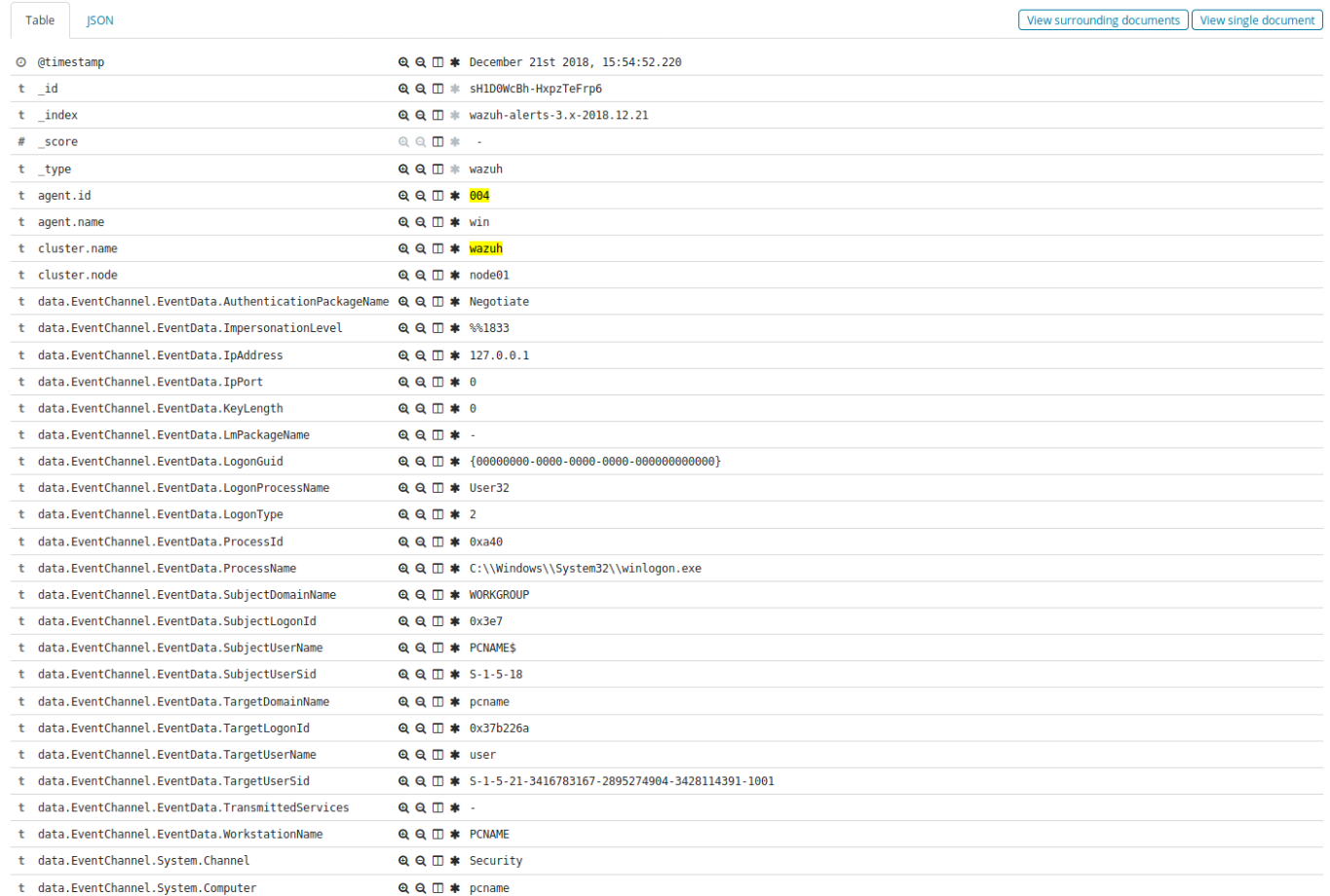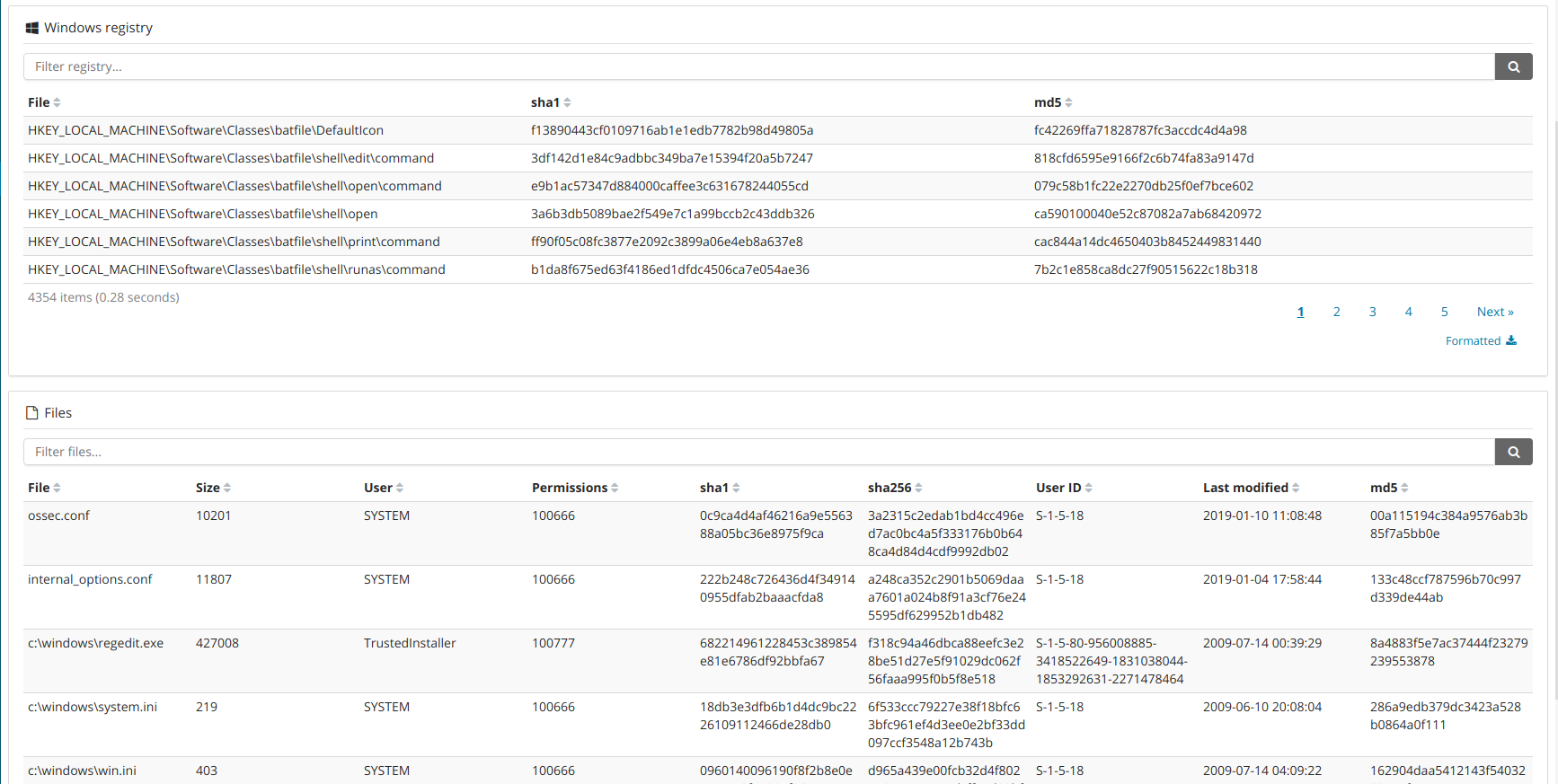3.8.0 Release notes
This section shows the most relevant improvements and fixes in version 3.8.0. More details about these changes are provided in each component changelog:
Wazuh core
Support for new AWS services
AWS Config
AWS Trusted Advisor
AWS KMS
AWS Inspector
Add support for IAM roles authentication in EC2 instances.
Adding new kind of buckets to your integration is as simple as adding an entry like this to your AWS configuration:
<bucket type="config">
<name>wazuh-aws-wodle</name>
<path>config</path>
</bucket>
The alerts that Wazuh sends to Elasticsearch are now including all these AWS additions, so you can track all your AWS services / buckets using Kibana.
Windows events are collected in native JSON
The inventory features for Windows are now using native queries directly to the Windows API, this adds value for this feature, enriches the inventory for Windows and guarantees that you can check your Windows agent accurately.
Windows events are now being fetched in JSON format, which provides a useful format for third-party software and makes Wazuh be more optimized while analyzing Windows events. This improves Windows alerts result and analyzing performance. From this version, Windows agents apply a new rule set

FIM for Windows agents now has the ability to detect changes in attributes and file permissions.
Agents keys polling module
When Remoted reads an invalid key, now it can retrieve it from an external database server and store it to the client.keys file.
Details:
Integrated agent key request to external data sources.
Look for missing or old agent keys when Remoted detects an authorization failure.
Request agent keys by calling a defined executable or connecting to a local socket.
FIM who-data changes
Added a health check for who-data monitoring features. It checks if the Audit events socket is working before starting the who-data engine in order to avoid start listening to it when it's blocked or disabled.
Checks if a rule already exists before trying to insert it to avoid flooding in the audit.log file.
Who-data module is now able to re-connect to an Audit socket even if the instance is using enforcing with SELinux. Before this enhancement, Wazuh could not re-connect the socket after restart Wazuh if enforcing was being used along Audit.
CDB lists auto build
Now the CDB lists are built at installation time, so there is no need to execute ossec-makelists as before for the default lists. Custom lists (added after installation) still need to be compiled manually.
Other Wazuh core fixes and improvements
When upgrading, databases used for FIM purposes are now auto-upgraded by Wazuh (no need for scripts).
Vulnerability detector has been improved for RedHat systems.
This version also fixes some known issues when using Wazuh on ARM, HP-UX or AIX systems.
Logcollector component has been refactored, multiple known issues have been fixed, its performance has been also improved.
Improved IP address validation in the option
<white_list>(Credits to @pillarsdotnet).Improved rule option
<info>validation (Credits to @pillarsdotnet).Fixed error description in the osquery configuration parser (Credits to @pillarsdotnet).
The FTS comment option
<ftscomment>was not being read (Credits to @pillarsdotnet).
Wazuh API
New API calls for group management
Edit group configuration file (agent.conf) uploading XML file with new configuration. This addition brings the user the ability to manage groups remotely, from now and onwards it's no longer needed to SSH into the manager instance to modify groups or to add/remove agents in groups.
curl -u foo:bar -X POST -H 'Content-type: application/xml' -d @/tmp/agent.conf.xml \
"http://localhost:55000/agents/groups/default/files/agent.conf?pretty"
{
"error": 0,
"data": "Agent configuration was updated successfully"
}
Add or remove agents of a group in bulk.
Added a new parameter named format for fetching the agent.conf content in JSON/XML format depending on the parameter value.
Wazuh API also has these fixes for this version
Now the Wazuh API service gets the group ID and user ID properly when using Docker containers.
Added missing information when requesting certain files from a group.
Rule variables from the Wazuh ruleset are now replaced by its real value when fetching rules.
Wazuh app
Group management from the app is now available
Manage your groups from the app, this feature includes:
Edit group configuration (agent.conf), just open the XML editor we've added, edit the group configuration and send it to the Wazuh API.

Adding and removing agents in groups. An intuitive view has been added to drag-drop agents in your groups then a button is clicked and your groups are updated.

New search bar for the agents' list
The search bar has been modified to provide an better user experience.
It suggests filters, allows multiple filters at the same time, combines string searches with filters, same as before but now in one place.

New tables for an agent FIM monitored files
The app detects the agent OS in order to show the right FIM data. For instance, if it's a Windows agent, the app shows Windows registry entries.

As most of the app tables, these tables include a search bar and sortable columns.
Modify the Wazuh monitoring index pattern name
This was added before for Wazuh alerts indices, now you can do the same for monitoring indices editing the app configuration file (config.yml).
# Default index pattern to use for Wazuh monitoring
wazuh.monitoring.pattern: wazuh-monitoring-3.x-*
Edit the app configuration file (config.yml) from the app
Those settings are shown at Settings > Configuration as before but now they include a pencil icon which allows you to edit certain settings.
Note: Some settings need that Kibana is restarted before being applied.
Other app improvements
The Dev Tools utility has been improved, small bugs fixed, resizable columns by dragging.
Template check from the app health check now accepts multipattern templates.
All known fields for all the index patterns are now refreshed on the app health check too.
Added "Registered date" and "Last keep alive" in agents table allowing you to sort by these fields.
Now the app looks for the request target if the destination is unreachable. Now you'll know if it was Elasticsearch or the Wazuh API.
Wazuh ruleset
New rules/decoders for Windows
Our ruleset this time comes with some new rules/decoders for Windows:
Added new rules to support the new Windows eventchannel decoder.
Extend Auditd decoder to support more fields.
And we've added a new rule to alert when an agent is removed.